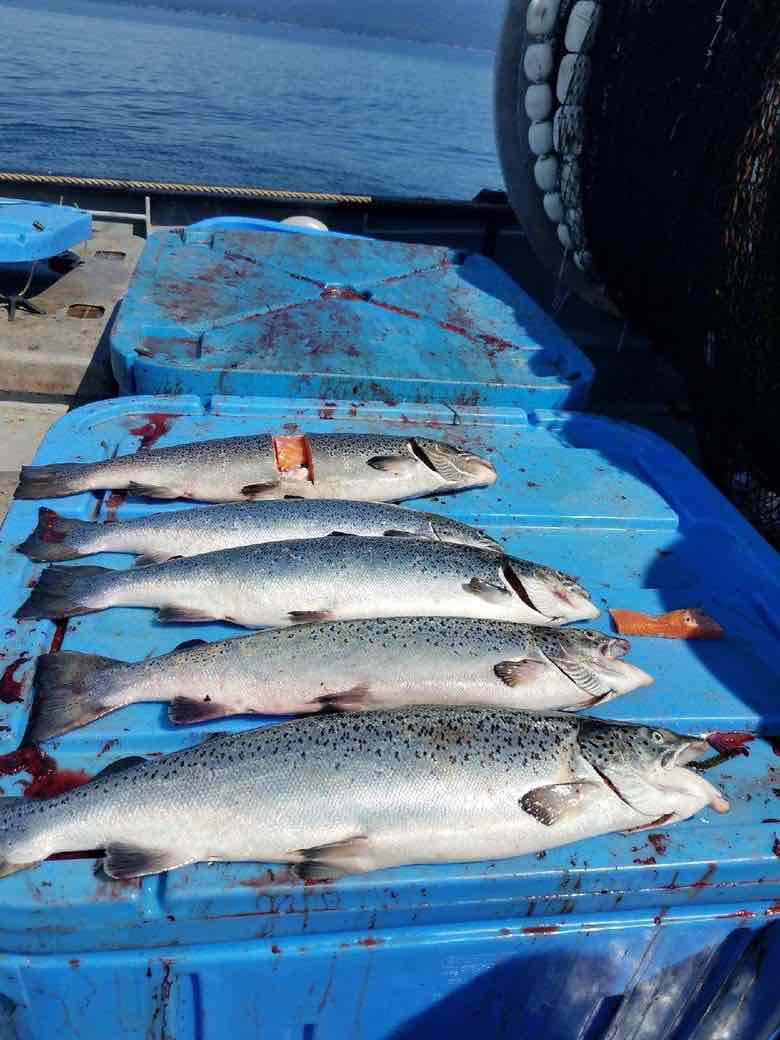forum
library
tutorial
contact

Ban Atlantic Salmon Farming
in Washington Waters
by David R. Montgomery
Seattle Times, August 29, 2017
|
the film forum library tutorial contact |

|
Ban Atlantic Salmon Farming
by David R. Montgomery
|
A review of studies of fish introductions in Europe, North America, Australia and New Zealand
found that more than three out of four introductions led to a decline in native fish populations.
 What were they thinking? No, not the fish farmers who blamed the recent solar eclipse for more than 100,000 Atlantic salmon escaping into Puget Sound. I mean the state regulators who allowed farmed Atlantic salmon into Washington waters in the first place.
What were they thinking? No, not the fish farmers who blamed the recent solar eclipse for more than 100,000 Atlantic salmon escaping into Puget Sound. I mean the state regulators who allowed farmed Atlantic salmon into Washington waters in the first place.
This environmental calamity points out something painfully obvious that seems lost on state regulators and fisheries managers. Atlantic salmon belong in the Atlantic Ocean and the rivers draining to it -- not in Puget Sound.
In the late 1990s, the state convened an independent panel of scientists to evaluate the state salmon recovery plan. I served on the panel, and one of the first questions I asked was what lessons could we learn from the history of salmon management failures in Europe and New England -- the realm of the critically endangered wild Atlantic salmon.
The response from our agency handlers was striking. Had there really been huge salmon runs in New England? Who knew? Searching for lessons pertinent to our region I set out to find answers, the subject of my first book, "King of Fish: The Thousand-Year Run of Salmon."
What had caused the decline of wild salmon in other regions? In region after region, wild-salmon runs were sacrificed to short-term interests -- the so-called 4 H's: Harvest (overfishing), habitat (logging), hydro (dams) and hatcheries intended to substitute for lost habitat and compensate for overfishing.
Of course, the contributions of each H differed between rivers and regions, but the general pattern has broad relevance for contemporary salmon management. In allowing Atlantic salmon farming in Puget Sound, our state salmon managers added another shortsighted chapter to the long history of mismanaging wild salmon.
Why is introducing Atlantic salmon to Pacific waters a patently bad idea? Consider their basic ecology. Much like the ancestral salmon of 20 million years ago, today's Atlantic salmon are habitat generalists, capable of colonizing rivers and streams throughout a watershed. The Pacific salmon evolved with the tectonics of our region -- the Cascades and Olympic Mountains rising from a broad coastal plain. As the land changed, the fish did, too. Pacific salmon became habitat specialists, with different species spawning and rearing in different portions of a watershed.
Habitat generalists like the Atlantic salmon are well suited for colonizing new environments. Despite assurances that farmed Atlantic salmon would not escape and could not compete for food or establish spawning runs if they did, tens of thousands of Atlantic salmon escape each year in British Columbia and compete with native salmon for wild food. Escaped Atlantic salmon have successfully spawned in B.C. waters and have been found as far north as Alaska, where farming them is banned.
While the Washington Department of Fisheries and Wildlife acknowledged that escaped Atlantic salmon could successfully spawn back in 1999, so far no wild spawning populations of Atlantic salmon are known to have become established in Washington. This is part of why the potential for Atlantic salmon to colonize Pacific Northwest rivers is generally considered low.
But that doesn't mean that it can't happen. A 2006 U.S. Forest Service report by a world-renowned salmon biologist who examined the potential for Atlantic salmon to colonize Pacific Northwest rivers concluded that it could take a prolonged colonization period before wild Atlantic salmon populations exploded into exponential growth. This latest mass escape of Atlantic salmon should remind us all of how black swans -- surprising events that nobody forecast or considered possible -- can become the downfall of the best-laid plans and render industry assurances and agency assumptions equally worthless.
The damage that introduced species can wreak on endangered species is well known. A review of studies of fish introductions in Europe, North America, Australia and New Zealand found that more than three out of four introductions led to a decline in native-fish populations. How does it make any sense to allow introducing a fecund habitat generalist into an environment where society is fighting to protect the remnants of wild populations? The inverse scenario is already playing out with introduced Pacific salmon now established in the Great Lakes.
State regulators should not permit further expansion of Atlantic salmon net pens in Puget Sound, the Strait of Juan de Fuca -- or other waters of the state. Instead, they should move to phase out Atlantic salmon farming before permanent damage is done.
Back in 2003, I closed "King of Fish" by asking whether contemporary salmon management would choose hubris or humility as the next H in the Pacific salmon saga. I fear we've just learned the answer.
Related Pages:
Questions Remain after Farmed Salmon Escape into Sound by Jacqueline Allison, Go Anacortes, 8/30/17
Why Are Atlantic Salmon Being Farmed in the Northwest? by Courtney Flatt, Northwest Public Radio, 8/29/17
'Environmental Nightmare' After Thousands of Atlantic Salmon Escape Fish Farm by Courtney Flatt, Northwest Public Radio, 8/24/17
learn more on topics covered in the film
see the video
read the script
learn the songs
discussion forum
